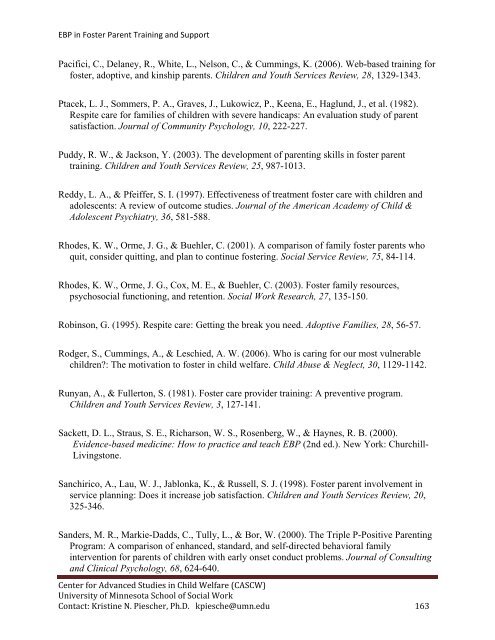Evidence-Based Practice in Foster Parent Training and Support ...
Evidence-Based Practice in Foster Parent Training and Support ...
Evidence-Based Practice in Foster Parent Training and Support ...
You also want an ePaper? Increase the reach of your titles
YUMPU automatically turns print PDFs into web optimized ePapers that Google loves.
EBP <strong>in</strong> <strong>Foster</strong> <strong>Parent</strong> Tra<strong>in</strong><strong>in</strong>g <strong>and</strong> <strong>Support</strong>Pacifici, C., Delaney, R., White, L., Nelson, C., & Cumm<strong>in</strong>gs, K. (2006). Web-based tra<strong>in</strong><strong>in</strong>g forfoster, adoptive, <strong>and</strong> k<strong>in</strong>ship parents. Children <strong>and</strong> Youth Services Review, 28, 1329-1343.Ptacek, L. J., Sommers, P. A., Graves, J., Lukowicz, P., Keena, E., Haglund, J., et al. (1982).Respite care for families of children with severe h<strong>and</strong>icaps: An evaluation study of parentsatisfaction. Journal of Community Psychology, 10, 222-227.Puddy, R. W., & Jackson, Y. (2003). The development of parent<strong>in</strong>g skills <strong>in</strong> foster parenttra<strong>in</strong><strong>in</strong>g. Children <strong>and</strong> Youth Services Review, 25, 987-1013.Reddy, L. A., & Pfeiffer, S. I. (1997). Effectiveness of treatment foster care with children <strong>and</strong>adolescents: A review of outcome studies. Journal of the American Academy of Child &Adolescent Psychiatry, 36, 581-588.Rhodes, K. W., Orme, J. G., & Buehler, C. (2001). A comparison of family foster parents whoquit, consider quitt<strong>in</strong>g, <strong>and</strong> plan to cont<strong>in</strong>ue foster<strong>in</strong>g. Social Service Review, 75, 84-114.Rhodes, K. W., Orme, J. G., Cox, M. E., & Buehler, C. (2003). <strong>Foster</strong> family resources,psychosocial function<strong>in</strong>g, <strong>and</strong> retention. Social Work Research, 27, 135-150.Rob<strong>in</strong>son, G. (1995). Respite care: Gett<strong>in</strong>g the break you need. Adoptive Families, 28, 56-57.Rodger, S., Cumm<strong>in</strong>gs, A., & Leschied, A. W. (2006). Who is car<strong>in</strong>g for our most vulnerablechildren?: The motivation to foster <strong>in</strong> child welfare. Child Abuse & Neglect, 30, 1129-1142.Runyan, A., & Fullerton, S. (1981). <strong>Foster</strong> care provider tra<strong>in</strong><strong>in</strong>g: A preventive program.Children <strong>and</strong> Youth Services Review, 3, 127-141.Sackett, D. L., Straus, S. E., Richarson, W. S., Rosenberg, W., & Haynes, R. B. (2000).<strong>Evidence</strong>-based medic<strong>in</strong>e: How to practice <strong>and</strong> teach EBP (2nd ed.). New York: Churchill-Liv<strong>in</strong>gstone.Sanchirico, A., Lau, W. J., Jablonka, K., & Russell, S. J. (1998). <strong>Foster</strong> parent <strong>in</strong>volvement <strong>in</strong>service plann<strong>in</strong>g: Does it <strong>in</strong>crease job satisfaction. Children <strong>and</strong> Youth Services Review, 20,325-346.S<strong>and</strong>ers, M. R., Markie-Dadds, C., Tully, L., & Bor, W. (2000). The Triple P-Positive <strong>Parent</strong><strong>in</strong>gProgram: A comparison of enhanced, st<strong>and</strong>ard, <strong>and</strong> self-directed behavioral family<strong>in</strong>tervention for parents of children with early onset conduct problems. Journal of Consult<strong>in</strong>g<strong>and</strong> Cl<strong>in</strong>ical Psychology, 68, 624-640.Center for Advanced Studies <strong>in</strong> Child Welfare (CASCW)University of M<strong>in</strong>nesota School of Social WorkContact: Krist<strong>in</strong>e N. Piescher, Ph.D. kpiesche@umn.edu 163
















